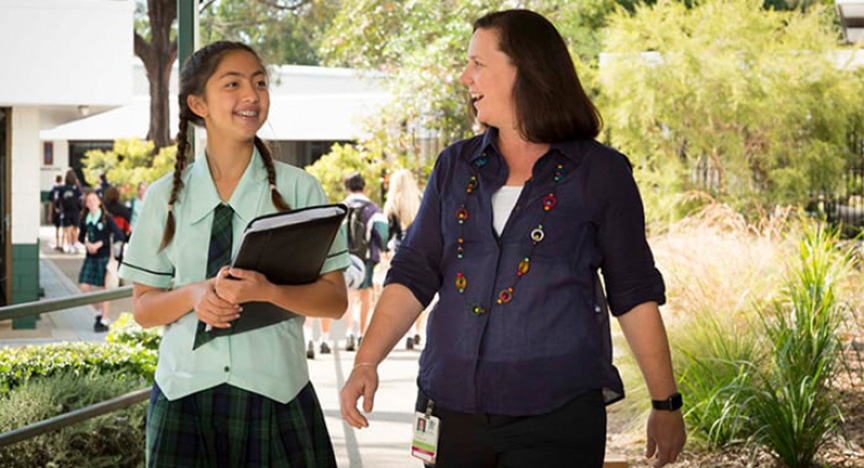
Starting a new school year can be hard at the best of times, but when it comes to transitioning from primary school to high school a few more difficulties can come into play. Some young people find adjusting to a new environment straightforward, while others can find it challenging. Adolescence and puberty is a time of major changes: physically, socially and emotionally. It is a time of cognitive development, physical growth and sexual development.
During puberty, teenagers often become more self-conscious and sensitive to how their body is changing. Changes to their hormones can also cause fluctuating moods. From age 12, it is normal for children to go through some confusion about their changing identity and role. They especially seek to have a sense of belonging and identity through their peer group. Adolescents are attracted to friends who share common interests with them such as their beliefs, values and priorities. The identity phase is only just beginning in early adolescence and continues until children are about 19 years old.
As you can see, this is a time for major life changes. Throw a new school in the mix and there may be some hurdles to feeling calm. So what are some of the barriers a young person can face when transitioning to high school?
Potential difficulties when starting high school
- A new environment with no friends from primary school
- Large amount of students at high school compared to primary school can feel intimidating
- Increased travel time to high school, or travelling more independently, such as on the bus
- Difficulties learning, or not having interest in academic learning
- Social anxiety, particularly for those who do not like crowds or meeting new people
- History of being bullied
Some of these difficulties can turn into anxiety for young people. Here are some warning signs that your child might be feeling uneasy about starting high school.
Signs of transitioning to high school anxiety
- Feeling physically sick – shallow breathing, vomiting, feeling overwhelmed
- Worrying, overthinking, feeling self-conscious, particularly during morning routine
- Not eating or sleeping well
- Not interested in going to school
- Asking a lot of questions and seeking constant reassurance
- Changes in behaviour – either more aggressive or more withdrawn/quiet
Thankfully, there are some practical steps you can take to help your child transition more easily into high school.
Tips to help your child transition smoothly
Plan and prepare for making friends
Talk to your child about how to introduce themselves and start a conversation. Some children may need more support than others depending on their temperament and social skills. You could prepare a pretend conversation and talk your child through how to start, continue and end a conversation.
For example, “Hi my name is Jack, which primary school are you from? What sports do you play? What is your favourite subject?”
Teach your child non-verbal communication including body language, eye contact, how to show interest and politeness.
Familiarise your child with the layout of the school
Look through the school map with your child and show them landmarks such as the school office, their classrooms, toilets, canteen etc. Teach them that it’s ok to ask for help if they get lost when trying to find their way around. Practice conversations with them about how to ask for help. For example, “excuse me, I am new here, can you please help me find this classroom?”
Being prepared and ready for the first day of school
Have a chat with your child the night before their first day of school. Be calm, reassuring and talk to them about what their first day might be like. Have their school uniform ready along with a packed bag with lunch, books and stationery. Explain to them the start and finish time of school, and how to become familiar with their timetable.
If you child has special considerations that need to be known by the school, contact the school office. For example if your child requires medical assistance or has special needs or behavioural issues, it’s important to let the school know. Talk to your child and assure them that the school is aware of their needs.
Become familiar with transport routes to and from school
If your child is going to catch public transport to school for the first time, it may be a good idea to have a practice run of their journey. Explain to them how the public transport system works and where they should get on and off the bus/train. Make them familiar with their bus or train timetable. If you are planning to transport your child by car, let them know where you will drop them off and pick them up. If they are walking to school, have a practice run of the walking route. Plan for unexpected events, such as what to do if they have missed their bus/train, how they can get help if they need it and who they can contact.
Talk to them at the end of the day
Choose the right time and place to talk to your child about how their first day went. Some children may be physically tired straight after school and may want some down time before talking about their day. Others may be the opposite. If your child is quiet and gives short answers to how their day went, as them more specific questions. Always keep calm and be reassuring, and praise them for attending high school – make a big deal of how well they are doing or how hard they try. After all, high school is a big step and they should be proud of themselves.